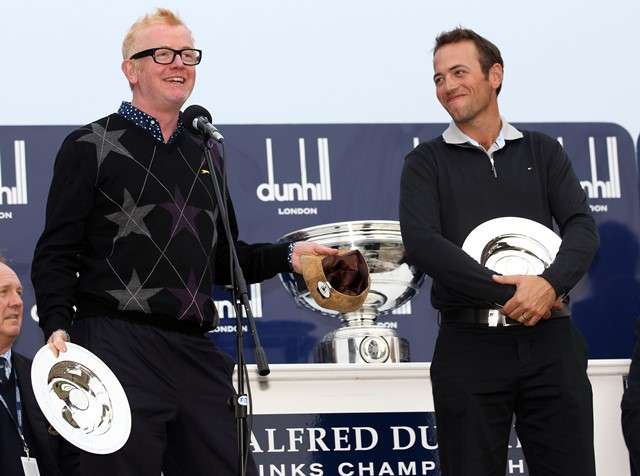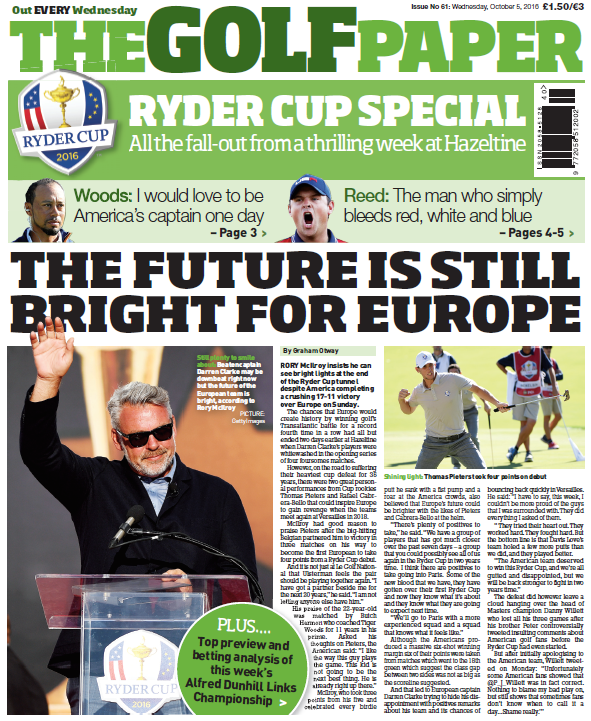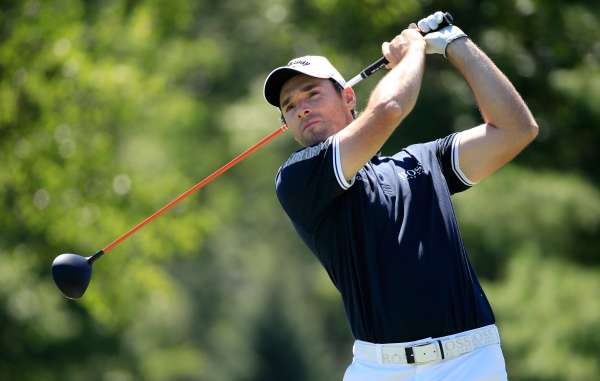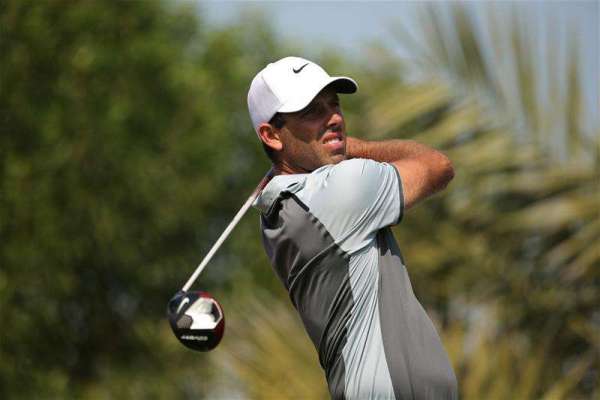Golf news
Jeremy Chapman: Honesty must be part of pro-ams

Sour taste: Chris Evans’ performance at Dunhill in 2011 called his handicap into question (Photo by Getty Images)
Pre-tournament twittering concerning debutant Kevin Pietersen having potentially the dodgiest handicap in the Dunhill Links pro-am – not borne out by subsequent scores – sent the mind racing back four years to the banishment of famed TV and radio presenter Chris Evans.
Why England’s greatest batsman’s handicap was singled out for social media scrutiny is unclear. In the event, his pro partner Eddie Pepperell’s uncharacteristic 74-81 start scuppered any chance they may have had.
But there was nothing unclear about the way Evans was shown the door by the organisers of Europe’s richest pro-am after romping home with Nick Dougherty as his pro in 2011.
Evans would have teed off as reigning champion for 2012, but was icily informed not to darken Dunhill’s doorstep again after having entered himself with a handicap of 15.
Even though allowed only ten of those 15 under the two-thirds handicap pro-am rule, Evans somehow improved by no fewer than 25 shots on Dougherty’s paltry four-under 212 for the first three rounds – a total that failed to qualify Nick for the Sunday shootout at St Andrews.
Evans improved at least seven times on his professional’s 66 on day one, at least eight on day two and by ten on day three.
On the final day, if the team qualifies but the pro does not, he still plays to help the amateur, but – as he is no longer competing individually – he does not return an official score.
Suffice to say, Dougherty did manage to help Evans to a final-day 11-under-par 61 and a fabulous 40-under total of 248 that blew the opposition away, a result that led, as Evans later admitted, to plenty of “rumblings”.
There was a significant absence of logic in Evans’ explanation that “okay, we finished 40-under, which I’ve never heard of before, but that is a combination of mine and Nick’s score – and when you consider the leading professional finished 22-under-par, I don’t think it is entirely incredible”.
Yes, Chris, but Nick wasn’t ‘the leading professional’, was he? Merely an also-ran. It was naive in the extreme to go down that route. As our American friends would say: “You do the math!”
Further investigation at Pinheiros Altos, the Algarve course near Evans’ holiday home, confirmed his handicap there is 13. Their director of golf, Brian Evans, is a one-time tour player who happens to be a relative. Some members there would say Chris – who has been part of BBC radio’s commentary team at past Opens and the 2010 Ryder Cup – was a “very good” 13.
Evans compared his lifetime ban from the event to kids in the school playground, with “the boy who owns the ball taking it home because his team didn’t win” and saying jokingly that he was thinking of running a rival pro-am on exactly the same dates and calling it “the Dunghill Cup”.
But taking a cavalier attitude to handicaps is no joke. I played in the Le Touquet Amateur Classic across the Channel one year and a 17-handicap English visitor scored so many points that they rang his club in the Midlands and got a very different figure. Unsurprisingly, the “winner” did not collect his prize.
On another occasion, a Spanish resident (but not one wearing a sombrero) pulled a similar stunt in an ‘away’ fixture and spoilt the event for everybody else. And I well remember a pro-am at Vilamoura in the Algarve where a Scottish team led by professional David Robertson – a Dunbar professional with plenty of “previous” – had almost lapped the field after two rounds in a Longshot pro-am.
The PGA was requested to send out a marshal on the final day to check everything was being done according to Hoyle and – surprise, surprise – the team’s score was suddenly 20 strokes or so worse.
Of course, it might have been a leader’s natural nerves, exacerbated by having an official follow their game, that caused such a wide discrepancy. We shall never know. But they didn’t win, making everybody else a whole lot happier.
A few years later, after a rules transgression at the 1985 Open qualifier at Princes, Robertson – a former Scottish boys’ champion – was fined £20,000 and banned from playing as a pro for 20 years. He had a great trick with a ball marker, striding up to a green – before anyone else could see what he was up to – and arranging an advantage for himself of anything up to 20 feet.
Professionals, of course, don’t have handicaps they can manipulate, but they do have ball markers and, more recently, another Scot, Elliot Saltman, was barred for three months after his playing partners claimed he marked his ball incorrectly on at least five different occasions in the same round during a tournament in Russia in 2010.
The pros who bend the rules to breaking point are usually well known to their peers and my old pal, the late Stuart Brown, would rather withdraw if partnered with a dodgy one, because he said it was hard enough concentrating on his own game without having to keep a close eye on what was going on elsewhere.
Luckily, bad apples are a tiny, tiny minority and 99.9 percent of pro golfers are self-regulating beyond belief.
A prime example is Ryder Cup captain Darren Clarke. Two ahead with ten to play in the 2006 Irish Open at Carton House, he was in a bad lie in deep rough on the ninth when the bad-weather hooter sounded and play abandoned for the day.
The leprechauns desperate for a home victory must have been out in the night, because Dazzler’s ball was in a vastly improved state when he checked in next morning, with the green now in range.
A rules official confirmed he was entitled to play it from its “new” situation, but honest Clarke refused to do so, instead playing the sideways safety shot he had had in mind the night before. Dropping a stroke there and finishing weakly, he was beaten by two. But he slept easy.
“That’s the way I was brought up to play,” he said. “It just wouldn’t have been right to take advantage. My conscience just wouldn’t have allowed me to do it.”
The 2016 Ryder Cup is clearly in the best of hands. There will be no War on the Shore with gentlemen like Darren and DL3 running the tables. And team golf needs a pick-me-up after the shenanigans that marred the Solheim Cup.
Thankfully, bad days like that are few and far between – there are none of the ‘professional’ fouls that make football such a cynical experience, nor the drug-taking that tarnishes cycling – and its transparent honesty continues to make golf the envy of the sporting world.








